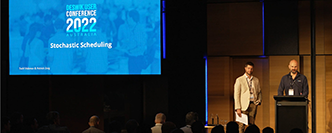Impacts of IPCC on Pit Shell Optimization
Deswik recently attended the IM Mining IPCC 2014 conference in Johannesburg. At this event, which Deswik co-sponsored with Sandvik, Marc Johnson presented a paper outlining the impact on pit shell optimization through the use of IPCC technology.
This paper outlined the process followed in the Deswik Software Suite to compare trucked material movements and an alternative strategy of semi-mobile in-pit crushing and conveying, and how this affects the resultant generated pit shell through an optimization process.
One of the key elements of strategic planning is “closing the loop”. That is, generating a mine plan based on a set of assumed inputs, and then testing the results of those inputs with the cost profile and product profile that result from that mine plan. It is common in initial phases of pit shell optimization to assume haulage costs are either a flat figure, or have a very simple relationship with depth. However, every deposit is different, and depending on both the pit design and the dump design, the resultant dump build sequence will determine the haulage requirements and associated costs. As such, the resultant cost profile will often differ quite significantly from what was originally assumed in the initial pit shell optimization.
Through the information available in the Detailed Dumping Report from Deswik.LHS (Landform & Haulage), relationships versus depth can be developed, including cycle time, truck hours and haulage cost per tonne. In the paper, Marc developed the requirements for a trucked scenario and a semi-mobile IPCC scenario and elaborated on the changing cost profile versus depth for each. These different cost profiles were then fed back through the LG Pit Optimization tools available in Deswik.CAD to develop two subsequent pit shells based on these depth versus haulage cost relationships.
The primary outcome from this work was to show that there was a significant variation between the initial assumed pit shell, and the resultant trucked and semi-mobile IPCC scenarios. This underpins the view from Deswik that significant value can be unlocked through the examination of alternate material movement strategies during early stages of project development. This can have a major effect on project economics, as well as the conversion from resources to reserves for open pit metals deposits.
Please contact your local Deswik office for assistance in unlocking this potential value from your deposit.
Marc Johnson
Regional Manager – Deswik South America



